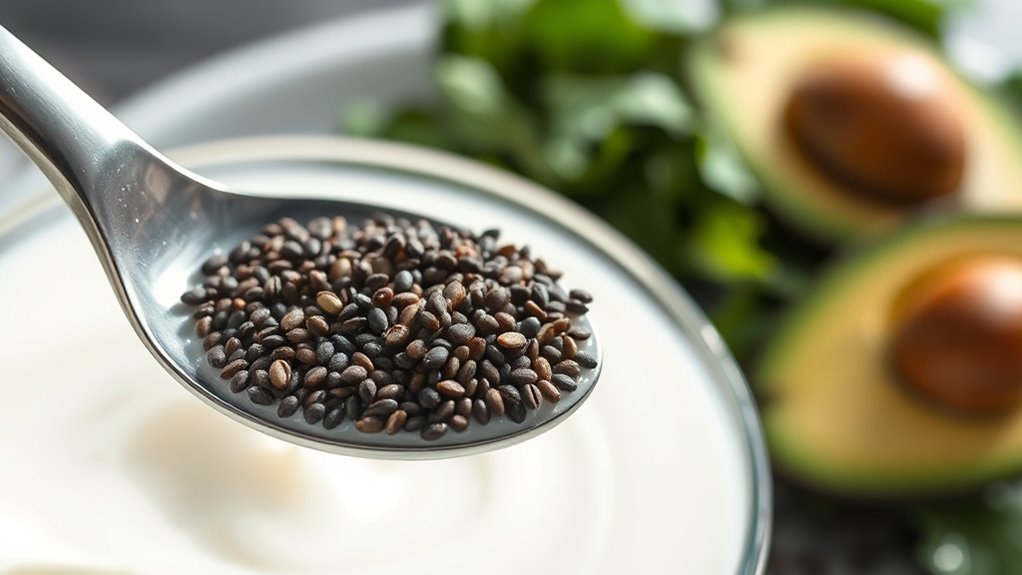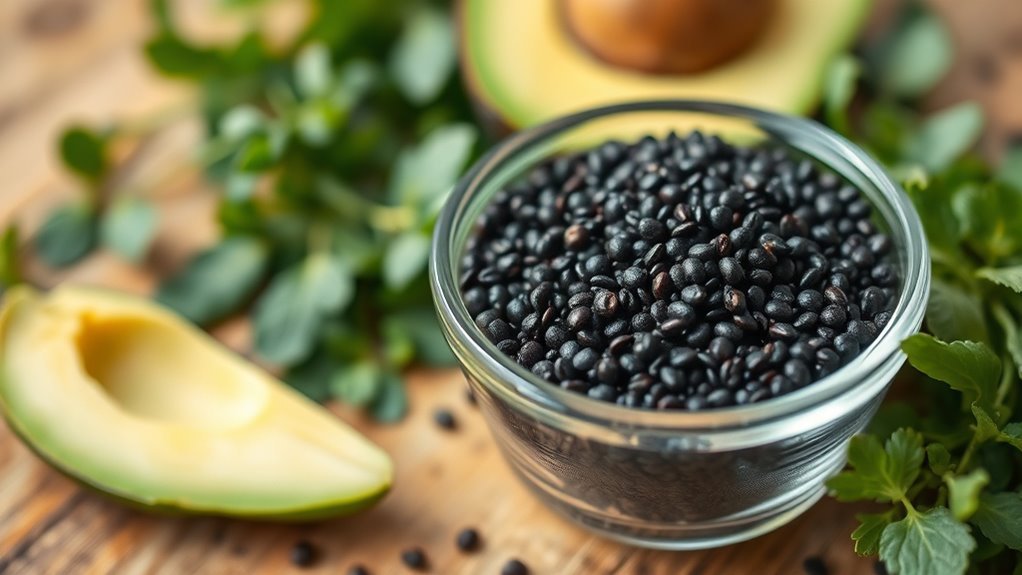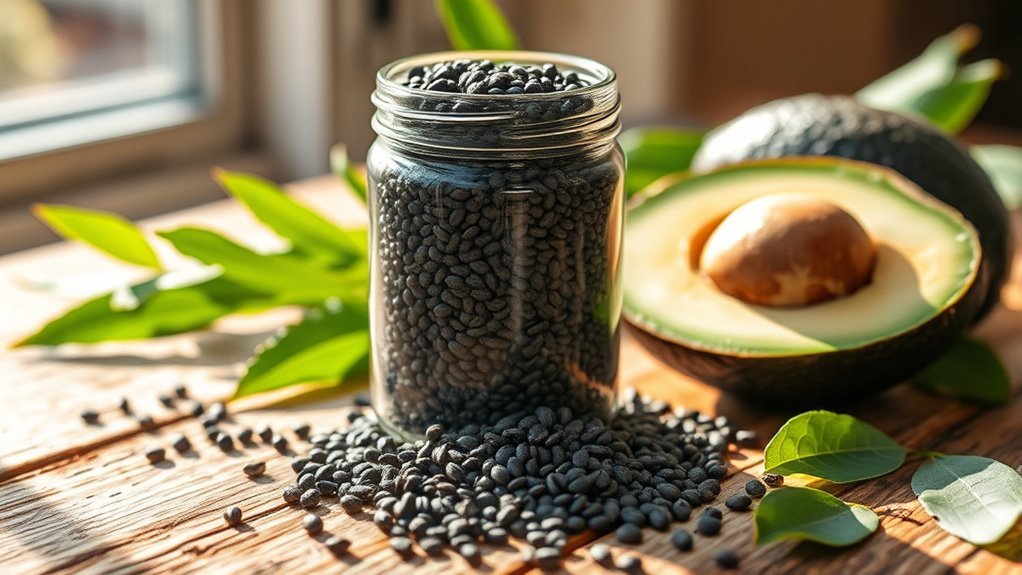Yes, chia seeds are keto-friendly! They’re low in net carbs, typically providing just 1-2 grams per serving due to their high fiber content. This makes them a great option for adding nutrition and texture to your meals. Packed with omega-3 fatty acids and antioxidants, they support heart health and digestion. Just be mindful of portion sizes to avoid digestive upset. Want to know how to incorporate them into your diet? There’s more to explore!
Nutritional Profile of Chia Seeds

Chia seeds, often hailed as a superfood, boast a remarkable nutritional profile that makes them a popular choice among health enthusiasts. Originating from the Salvia hispanica plant in Central Mexico, these tiny seeds come in several varieties, including black and white. Regardless of the variety, chia seeds are rich in omega-3 fatty acids, fiber, and protein, providing essential nutrients that support your overall wellness. They’re also low in calories, making them a versatile addition to various diets. Incorporating chia seeds into your meals can enhance satiety and improve digestion. So, if you’re looking to explore the health benefits of chia seeds, consider their origins and varieties as you choose the best option for your lifestyle.
Carbohydrate Content and Net Carbs

When considering chia seeds for a ketogenic diet, it is crucial to analyze their carbohydrate content and how to calculate net carbs. Despite having a higher total carbohydrate count, chia seeds are rich in fiber, which can greatly reduce their net carb impact. Understanding appropriate serving sizes can help you incorporate them into your meals without exceeding your carb limits.
Chia Seed Carbohydrate Breakdown
Although many people consider chia seeds a nutritious addition to their diet, understanding their carbohydrate content is essential for those following a ketogenic lifestyle. Chia seeds, originating from the Salvia hispanica plant, offer different varieties, each with unique nutrient profiles.
When evaluating chia seeds, keep in mind:
- They contain about 12 grams of carbohydrates per ounce.
- Approximately 11 grams of those carbs come from fiber, making them a good source of dietary fiber.
- This high fiber content can help you feel fuller while minimizing the impact on blood sugar levels.
Calculating Net Carbs
To effectively determine how chia seeds fit into a keto diet, you’ll need to calculate their net carbs, which are essential for maintaining ketosis. Net carbs are calculated by subtracting fiber from total carbohydrates. Chia seeds are high in fiber, making them a favorable choice.
Here’s a quick overview of chia seed serving and net carb calculation:
| Chia Seed Serving | Total Carbs (g) | Fiber (g) | Net Carbs (g) |
|---|---|---|---|
| 1 oz (28g) | 12 | 10 | 2 |
| 2 tbsp (28g) | 12 | 10 | 2 |
| 1 tbsp (15g) | 6 | 5 | 1 |
Incorporating chia seeds into your meals can help you enjoy variety while sticking to your keto goals!
Keto-Friendly Serving Sizes
While it’s important to contemplate the overall carbohydrate content of chia seeds, understanding the appropriate serving sizes is key to successfully incorporating them into your keto diet. A typical keto serving of chia seeds is about 1 to 2 tablespoons, which provides roughly 1-2 grams of net carbs. Keeping portion control in mind will help you enjoy the health benefits without exceeding your carb limits.
- Chia seeds are high in fiber, aiding digestion and promoting satiety.
- They can absorb water, expanding in your stomach and helping curb hunger.
- Proper serving sizes keep your macronutrient balance on track, ensuring you stay in ketosis.
Health Benefits of Chia Seeds

Chia seeds are a nutrient-rich superfood that can enhance your diet with essential vitamins and minerals. They’re known to support heart health by providing omega-3 fatty acids and fiber, which can help lower cholesterol levels. Additionally, their high fiber content aids in digestive wellness, making them a beneficial addition to your meals.
Nutrient-Rich Superfood
Packed with essential nutrients, chia seeds have garnered attention as a superfood, especially for those following a keto diet. Their impressive nutrient density offers various superfood benefits that can enhance your overall health.
- High in Omega-3 Fatty Acids: They support brain health and reduce inflammation.
- Rich in Fiber: This aids digestion and helps you feel full longer, perfect for keto.
- Loaded with Antioxidants: They combat oxidative stress, keeping your cells healthy.
Incorporating chia seeds into your meals not only provides you with a potent source of nutrition but also empowers your dietary choices. These tiny seeds pack a powerful punch, making them a valuable addition to your keto lifestyle. Embrace the freedom of nourishing your body with this nutrient-rich superfood!
Heart Health Support
Heart health is essential for overall well-being, and chia seeds can play a significant role in supporting it. These tiny seeds are rich in omega-3 fatty acids, which are known for their heart health benefits. Omega-3s help reduce inflammation, lower blood pressure, and decrease triglyceride levels, promoting better cardiovascular function. By incorporating chia seeds into your diet, you’re not just adding a nutritious element; you’re also supporting your heart’s well-being. Whether you sprinkle them on salads, blend them into smoothies, or mix them into yogurt, you’re harnessing the omega benefits that chia seeds offer. Remember, maintaining heart health isn’t just about what you avoid; it’s also about what you include in your diet for a balanced lifestyle.
Digestive Wellness Aid
In addition to supporting heart health, chia seeds offer significant benefits for digestive wellness. Their high fiber content plays an essential role in promoting digestive health, making them a great addition to your diet. When you incorporate chia seeds, you can experience the following fiber benefits:
- Improved Regularity: The soluble fiber in chia seeds helps regulate bowel movements and prevents constipation.
- Gut Health: They act as prebiotics, fostering the growth of beneficial gut bacteria, which can enhance overall digestive function.
- Satiety: Chia seeds absorb water and expand in your stomach, helping you feel full longer and reducing the urge to snack.
How Chia Seeds Fit Into a Keto Diet
Although you might think that seeds are generally off-limits on a keto diet due to their carbohydrate content, chia seeds actually offer a unique nutritional profile that makes them a suitable choice. With their high fiber and healthy fat content, chia seeds can complement your keto meal ideas while keeping carbohydrate intake low.
Here’s a quick overview of chia seeds’ nutritional benefits:
| Nutrient | Amount per 1 oz (28g) | Keto Friendliness |
|---|---|---|
| Calories | 138 | Yes |
| Carbohydrates | 12g | No |
| Fiber | 10g | Yes |
| Protein | 4g | Yes |
| Fat | 9g | Yes |
Incorporating chia seed recipes into your meals can enhance texture and nutrition without compromising your keto lifestyle.
Ways to Incorporate Chia Seeds Into Meals
Chia seeds can easily be added to a variety of meals, enhancing both flavor and nutrition without increasing your carb intake greatly. They’re versatile and can fit seamlessly into your daily routine.
Chia seeds enhance meals with flavor and nutrition, making them a versatile addition to your daily routine.
- Chia pudding: Mix chia seeds with almond milk for a quick, satisfying breakfast staple.
- Smoothie booster: Toss in a tablespoon for added texture and nutrients in your favorite smoothie.
- Salad topping: Sprinkle them on salads for a crunchy texture and a nutrient boost.
You can even use chia seeds in energy bites for a healthy snack option or as a dessert ingredient in recipes. They can also serve as an oatmeal replacement, making them a great choice for anyone looking to diversify their meals while staying keto-friendly.
Potential Risks and Considerations
While incorporating chia seeds into your diet can offer numerous health benefits, it’s important to be aware of potential risks and considerations. Some individuals may experience allergic reactions, leading to symptoms like itching, swelling, or even gastrointestinal distress. If you’ve got a history of allergies, it’s wise to start with a small amount and monitor your body’s response. Additionally, chia seeds are high in fiber, which can lead to digestive issues such as bloating or gas if consumed in excess or without adequate water. To avoid discomfort, make certain you hydrate well and gradually increase your intake. Being informed allows you to enjoy chia seeds while minimizing any adverse effects, giving you the freedom to explore their nutritional benefits safely.
Conclusion on Chia Seeds and Keto
When considering whether chia seeds fit into a ketogenic diet, it’s important to recognize their nutritional profile. These tiny seeds can offer significant chia seed benefits, making them a versatile addition to your meals.
- High in fiber, which can help maintain digestive health.
- Rich in omega-3 fatty acids, promoting heart health.
- Low in net carbs, aligning well with keto meal ideas.
Incorporating chia seeds into your keto plan can enhance your meals without disrupting your carb limits. You can add them to smoothies, yogurt, or salads for added texture and nutrition. Overall, chia seeds can be an excellent choice for those on a ketogenic journey, providing both satisfaction and health benefits while supporting your dietary goals.
Frequently Asked Questions
Are Chia Seeds Gluten-Free?
Think of chia seeds as tiny powerhouses, bursting with potential. Yes, chia seeds are gluten-free, making them a fantastic addition to your diet. They offer numerous benefits, including high fiber and omega-3 fatty acids. You can explore various chia seed recipes, like puddings or smoothies, to enjoy their nutritious perks. Embracing gluten-free options like chia seeds gives you the freedom to nourish your body while savoring delicious meals.
Can Chia Seeds Help With Weight Loss?
Yes, chia seeds can help with weight loss. They’re high in fiber, which keeps you feeling full longer, reducing overall calorie intake. Incorporating chia seed recipes into your meals can add nutrition without excess calories. You might try chia pudding or sprinkle them on salads. Their healthy fats also support metabolism. Just remember, while they offer weight loss benefits, a balanced diet and exercise are essential for lasting results.
How Should Chia Seeds Be Stored?
Storing chia seeds is like securing a treasure; you want to keep them safe for longer shelf life. The best storage method is in an airtight container, kept in a cool, dark place, like your pantry. This way, you’ll maintain their freshness for up to two years. If you prefer, you can also refrigerate or freeze them for even longer storage, ensuring you always have these nutritious seeds on hand when you need them.
Do Chia Seeds Have Any Side Effects?
Chia seeds can have side effects for some people. If you’ve got allergies, you might experience reactions like itching or swelling. Regarding digestion, consuming too many chia seeds at once can lead to bloating or gas, especially if you don’t drink enough water. It’s best to start with small amounts and see how your body reacts. Balance is key to enjoying their benefits without discomfort. Always listen to your body!
Can I Eat Chia Seeds Raw?
Yes, you can eat chia seeds raw! They’re packed with nutritional benefits, including omega-3 fatty acids, fiber, and protein. However, soaking them in water or adding them to chia recipes can enhance their digestibility and texture. If you prefer them raw, just be mindful to drink plenty of water, as they absorb liquid. Enjoy these versatile seeds in smoothies, salads, or as a topping for yogurt to boost your meals!
1. Are chia seeds keto-friendly?
Yes, chia seeds are considered keto-friendly. They are low in carbohydrates and high in fiber, which means that their net carbohydrate content is minimal. A typical serving (about 28 grams or 2 tablespoons) contains around 12 grams of carbohydrates, but 10 of those grams are fiber, resulting in only 2 grams of net carbs. This makes them suitable for a ketogenic diet, which typically limits carbohydrate intake to promote ketosis.
2. How many carbs do chia seeds contain?
Chia seeds contain approximately 12 grams of carbohydrates per 28-gram serving. However, due to their high fiber content, the net carbs—those that impact blood sugar—are only about 2 grams. This makes chia seeds an excellent low-carb option for those following a keto diet.
3. What are the health benefits of chia seeds on a keto diet?
Chia seeds offer numerous health benefits, especially for those on a keto diet. They are rich in omega-3 fatty acids, which support heart health and may help reduce inflammation. Their high fiber content promotes digestive health and helps you feel full longer, which can be beneficial for weight management. Additionally, chia seeds are a good source of essential nutrients, including protein, calcium, and magnesium, making them a nutritious addition to your diet.
4. How can I incorporate chia seeds into my keto meals?
Chia seeds can be easily incorporated into various keto meals. You can add them to smoothies for added texture and nutrition, use them in keto-friendly puddings by soaking them in almond milk or coconut milk, or sprinkle them on salads for a crunchy topping. They can also be mixed into yogurt or used to thicken soups and sauces. Their versatility makes them a great ingredient to enhance both flavor and nutrition in your keto recipes.
5. Are there any drawbacks to consuming chia seeds on a keto diet?
While chia seeds are generally safe and nutritious, some individuals may experience digestive discomfort if consumed in large quantities due to their high fiber content. It’s important to increase fiber intake gradually and to stay hydrated. Additionally, while chia seeds are low in net carbs, they still contribute to your overall carb count, so moderation is key. Always consider your total daily carbohydrate intake when incorporating chia seeds into your keto diet.
References
- https://www.healthline.com/nutrition/chia-seeds-and-keto
- https://www.medicalnewstoday.com/articles/318695
- https://www.ncbi.nlm.nih.gov/pmc/articles/PMC6273582/
- https://www.ncbi.nlm.nih.gov/pmc/articles/PMC6267313/
- https://www.uclahealth.org/health/health-benefits-of-chia-seeds
- https://www.hsph.harvard.edu/nutritionsource/what-should-you-eat/
- https://www.mayoclinic.org/healthy-lifestyle/nutrition-and-healthy-eating/in-depth/chia-seeds/art-20045506


